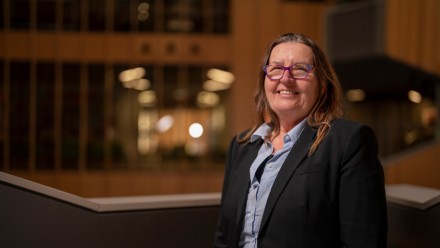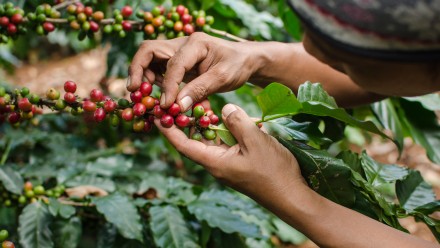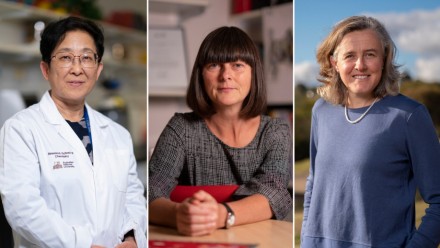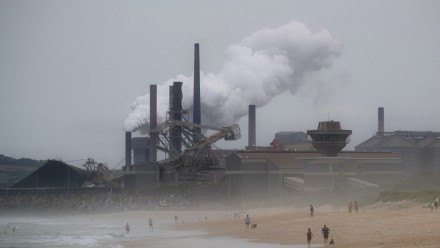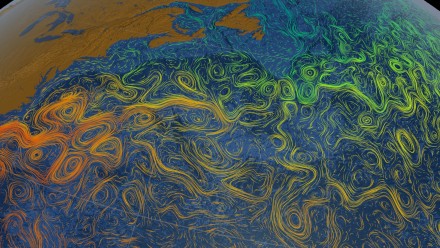Climate highlights 2021

Climate Change overview
Global progress on climate change in 2021 was marked by two important occasions. Firstly, the release of the Intergovernmental Panel on Climate Change (IPCC) Sixth Assessment Report (AR6) on the science of climate change in August. The second was the United Nations 26th Conference of the Parties (COP26) held in Glasgow in November.
The IPCC’s report made it clear that unless the world takes immediate action to rapidly and substantially reduce greenhouse gas emissions, we will not meet the targets set out in the Paris Agreement to keep global warming below the agreed 1.5-degree Celsius threshold. This set the tone for discussions at COP26, which in-turn led to a renewed focus on 2030 emissions reductions targets as vital to achieving the Paris Agreement goals.
ANU researchers made significant contributions to the conversation around both the IPCC climate report and COP26, with media coverage for each event reaching a potential audience in the tens of millions. The ICEDS public lecture on findings of the IPCC report was attended by over 1,000 people, which makes it the highest-attended event that the Institute has hosted, and our Pacific-outreach project provided guidance to decision-makers across the region. Many ICEDS members provided their insights on the COP26 negotiations and related matters, with some also attending the conference in person, showcasing the considerable breadth of expertise at ANU.
Research and news
12 Nov 2021
With the eyes of the world on COP26, researchers from ANU say the broader environmental and social implications of extreme emission reduction schemes need to...
26 Oct 2021
Four ANU experts warn that Pacific nations are at risk of being left behind in global climate negotiations if they aren’t a focus of the upcoming COP26 summit...
18 Oct 2021
Read more about how the PNG Government has begun to develop policies to encourage greater agricultural production in order to attain and maintain national...
7 Jul 2021
The fate of galaxies, building health equity for all and making new materials from "crystal chemistry" will be the focus of three major research...
31 May 2021
Opinion surveys across the big emitters reveal the social complexity surrounding climate policy commitments.
23 Apr 2021
A new UNSW/ANU study into how the speeds of ocean surface currents are changing over time.
Director's highlights
Professor Mark Howden has given over 200 presentations to policy, industry, academic and general audiences throughout the year, both as Director of ICEDS and in his capacity as Vice-Chair of the IPCC Working Group II.
Professor Howden has been engaged in considerable media activity in 2021. This includes interviews with ABC730, SBS, The Drum, The Canberra Times, AAP, CNN, Al Jazeera and Swedish National Radio. Throughout the year, Professor Howden was featured in over 1000 media items, reaching an audience of up to 10 million people, globally. This included extensive coverage following the release of the IPCC report, and during the United Nations COP26 climate summit.
Professor Howden also appeared alongside ICEDS Head of Energy, Professor Frank Jotzo, and UNSW’s Dr Sarah Kirkpatrick at the National Press Club address, Towards COP26: Hopes and Expectations. The video of this address can be viewed here.
Research publications
In 2021, researchers at ANU published over 300 articles relevant to climate-change in a number of high-profile journals, including Climate Policy, Frontiers in Climate, Sustainability, Nature Climate Change, Environmental Science and Policy, and more.
There were a number of articles published in 2021 by ANU researchers further developing environmental and systems modelling and risk assessment frameworks relevant to climate change. ANU researchers also helped to advance understanding of impacts and responses to climate change across diverse global ecosystems responses, and explored the necessary conditions for effectively supporting policy with climate science.
Specific notable foci of research included assessments of climate-related financial risks, opportunities for increasing agricultural yields in the context of changing climates, considerations of risk associated with stratospheric aerosol injection (SAI) to reduce global warming, and methods for effective communication of climate science.
ICEDS Director, Professor Mark Howden, contributed to a global reimagining of how to assess complex, interacting risks that arise both from climate change and responses to it. ANU researchers also contributed to a global stocktake of evidence on human adaptation to climate change.
Through the significant academic contributions they have made in 2021, ICEDS members continue to represent the enormous achievements of ANU as a global leader in climate change research.
Projects and initiatives
Public policy submission: Consultation on a National Climate Resilience and Adaptation Strategy
On 7 September, ICEDS members contributed to a policy submission to inform a new National Climate Resilience and Adaptation Strategy for Australia. The submission received a positive response from the Department of Agriculture, Water and the Environment and the Department of Industry, Science, Energy and Resources. Members acknowledged the contribution and noted that it had been circulated widely in the Departments.
It was also picked up by independent commentators with wide circulation through outlets such as the John Menadue Policy Forum, as well as by the International Red Cross with follow up meetings on collaboration planned.
ICEDS Policy roundtables
Throughout the year, ICEDS hosted a series of policy roundtables. These rountables led to further engagement and connections by various ANU researchers with a range of federal government agencies.
ANU Climate researchers invited to appear at public hearing for Climate Bills 2021
In 2020, ANU made a submission to the House of Representatives Standing Committee on the Environment and Energy inquiry into the Climate Bills 2020. Following the submission, Professor Mark Howden was invited to appear at a public hearing on the Bills in early 2021.
Climate smart agriculture for a food secure PNG
SciTech4Climate: Coming in 2022
Through a $5.5 million science and technology program, DFAT is partnering with ANU and CSIRO to develop practical actions to adapt to the effects of climate change and reduce greenhouse gas emissions in the Indo‑Pacific.
The Science and Technology for Climate (SciTech4Climate) partnership will connect leading Australian scientists and climate specialists with development partners in the Indo-Pacific to ensure our region’s response to climate change is supported by the best available science and technological advances.
CSIRO and ANU scientists and experts will work closely with partner governments, industry and local communities to translate cutting-edge science into novel, locally appropriate solutions to climate challenges. These partnerships will help our neighbours adapt to climate change and build their resilience to the challenges ahead.
This project is led by Dr Steve Crimp. More details, include project selections, will be announced in 2022.
For more information, visit the SciTech4Climate website.
ACU Climate researcher cohort
In the lead-up to COP26, the Association of Commonwealth Universities (ACU) hosted a cohort of 26 climate researchers across the globe, to build international collaborations and foster research leaders that engage with policy processes and stakeholders. As part of the cohort, ICEDS researcher Dr Rachel Friedman led a team of researchers in Nigeria, Sri Lanka, and Singapore in a cross-case study comparison of food production innovations to support climate resilience.
The results were shared and discussed as part of a roundtable panel with experts on the topic from Ghana, Fiji, and Bangladesh. with groups like the ACU allows ICEDS to expand its spheres of partnership and influence, and extend the reach of our research.
Member highlights
The following section highlights submissions made by ICEDS members, regarding their activity throughout the year.
Honorary Professor Robyn Alders
Honorary Professor Robyn Alders engaged in the following activity in 2021:
Research
-
International Development Research Centre (Canada) - new project - West African One-Health-Actions for Understanding, Preventing and Mitigating Outbreaks; project lead by Njala University in Sierra Leone.
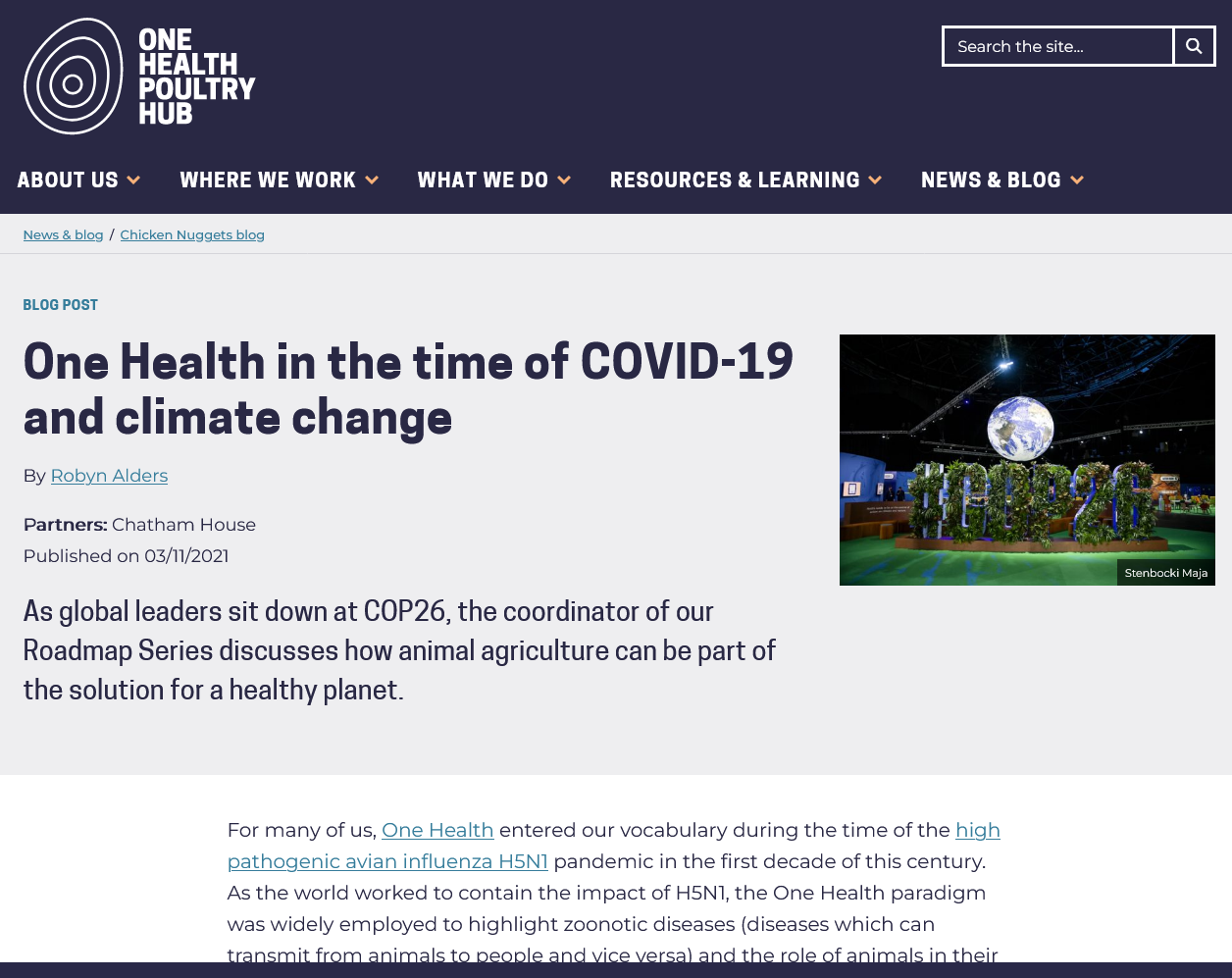
How can animal agriculture be a part of the solution for a healthy planet? Robyn Alders discusses in the ‘One Health in the time of COVID-19 and climate change blog. -
Alders, R.G., Campbell, A., Costa, R., Guèye, E.F., Hoque, M.A., Perezgrovas-Garza, R., Rota, A. and Wingett, K. 2021a. Livestock across the world: diverse animal species with complex roles in human societies and ecosystem services. Animal Frontiers 11(5):20-29.
-
Alders, R.G., Chadag, M.V., Debnath, N.C., Howden, M., Meza, F., Schipp, M., Swai, E.S. and Wingett, K. 2021. Planetary boundaries and Veterinary Services. Rev.Sci.Tech.Off.Int.Epiz. 40(2):439-453.
-
Butler, J.R.A., Davila, F., Alders, R., Bourke, R.M., Crimp, S., McCarthy, J., McWilliam, A., Palo, A.S.M., Robins, L., Webb, M.J., van Wensveen, M., Sanderson, T. and Walker, D. 2021. A rapid assessment framework for food system shocks: Lessons learned from COVID-19 in the Indo-Pacific region. Environmental Science and Policy 117:34-45.
-
Dasgupta, R., Tomley, F., Alders, R., Barbuddhe, S.B. and Kotwani, A. 2021.Adopting an intersectoral One Health approach in India: Time for One Health Committees. Indian Journal of Medical Research 153(3):281-286.
-
Davila, F., Bourke, R.M., McWilliam, A., Crimp, S., Robins, L., van Wensveen, M., Alders, R.G. and Butler, J.R.A. 2021. COVID-19 and food systems in Pacific Island Countries, Papua New Guinea, and Timor-Leste: Opportunities for actions towards the sustainable development goals. Agricultural Systems 191: 103137
Media
-
One Health in the time of COVID-19 and climate change, One Health Poultry Hub, 3 November.
Public policy
-
Pre-COP26 Policy Roundtable: Climate Adaptation and Resilience organised by ICEDS
-
Food and Agriculture Organization of the United Nations: consultancy supporting policy development in support of sustainable enhancements to small-scale livestock productivity
Outreach
-
Invited webinar presentation: "Global Food Security and Healthy Eating in the time of COVID-19". Philippine Obstetrical and Gynecological Society Webinar, 10 April
-
Invited workshop presentation: "Food and Feed: How to install new practices", Planet A Workshop: Agriculture, guarantor of the One Health approach: challenges, innovations, good practices, France. 24 June
-
Invited congress presentation: "Decreased zoonotic disease, increased food safety: the multiple benefits of a One Health approach to Public Health Emergency Preparedness". 5th World Congress on Disaster Management, India. 24 November
-
Invited conference presentation: "One Health and sustainable food safety, security and systems". 22nd EMBL One Health: Integrating Human, Animal and Environmental Health, Germany, 3 December
Associate Professor Chris Ballard
Associate Professor Chris Ballard’s work focuses on the relationship between culture and cultural heritage and disasters, emergencies and climate change, with a focus on the Asia Pacific region; a current research project addresses the 15th C VEI7 eruption of Kuwae in Vanuatu, and its local, regional and global consequences.
In 2021, Professor Ballard was engaged in the following activity:
Research
-
Chief Investigator (with CI Stuart Bedford), ARC Discovery Grant, Kuwae 1452 AD: multi-disciplinary perspectives on a Pacific super-eruption.
-
Sebak Saha and Chris Ballard 2021. ‘Cyclone Aila and post-disaster housing assistance in Bangladesh.’ Sustainability 13, 8604.
-
Kelsie Long, Larissa Schneider, Simon Connor, Niamh Shulmeister, Janet Finn, Georgia Roberts, Atun Zawadiszki, T. Gabriel Enge, John P. Smol, Chris Ballard, Simon G. Haberle 2021. ‘Human impacts and Anthropocene environmental change at Lake Kutubu, a Ramsar wetland in Papua New Guinea.’ PNAS 118(40):
-
Chris Ballard 2021. ‘Transmission’s end? Cataclysm and chronology in Indigenous oral tradition.’ In Ann McGrath and Lynette Russell (eds) The Routledge Companion to Global Indigenous History. London: Routledge, pp. 571-602.
Education
-
Convenor, MA course in S2, ASIA8048, Disasters and Epidemics in Asia and the Pacific Facilitator, UNESCO Training Workshop on Intangible Cultural Heritage in Emergencies, Philippines, May-July
-
Chair Supervisor for ANU PhD thesis conferred in 2021: Sebak Saha, Social Capital and Post-Disaster Response and Recovery: Cyclone Aila in Bangladesh, 2009.
-
Chair Supervisor for ANU MA (Advanced) Asia-Pacific Studies sub-thesis conferred in 2021: Akiko Hirata, Integrating Local Knowledge into Tsunami Risk Reduction.
Public policy
-
Lead author, Joint White Paper on Cultural Heritage and Climate Change: New Challenges and Perspectives for Research, Joint Project Initiative (JPI) Climate and JPI Cultural Heritage, European Union.
-
Co-Author, White Paper 2: Impacts, Vulnerability and Understanding Risks, for International Co-Sponsored Meeting on Culture, Heritage and Climate Change, co-sponsored by United Nations Educational, Scientific and Cultural Organization (UNESCO), the International Council on Monuments and Sites (ICOMOS), and the Intergovernmental Panel on Climate Change (IPCC), in partnership with International Union for the Conservation of Nature (IUCN) and ICLEI (Local Governments for Sustainability)
-
Sole Author, Concept Note on Intangible Cultural Heritage and Climate Change, commissioned by Living Heritage Entity, UNESCO, Paris.

Dr Christopher Ballard discussed what ancient cataclysms , such as the Kuwae eruption, might have to teach us about possible responses to contemporary climate change at the ‘In Conversation’ event.
Outreach
-
Culture and the mitigation of geohazard disasters. Invited paper, 16th Regional Geoscience Congress of Southeast Asia (GEOSEA XVI), 2-8 December.
-
Stratigraphic Insights into the ~AD1450 caldera-forming Kuwae eruption sequence, central Vanuatu, South Pacific. Paper presented at Geoscience Society of New Zealand Annual Conference, University of Canterbury, Christchurch, New Zealand, 22-25 November. [Sönke Stern, Shane Cronin, Stuart Bedford, Chris Ballard, Nicola Strandberg, Sandra Nogue-Bosch and David Sear]
-
Material witnesses: the Kuwae eruption and Tongoan histories. Paper for the Symposium on Returns and Reconnections: Relationships with the Deep Past? Hosted by the Research Centre for Deep History (ANU) and the McDonald Institute for Archaeological Research (University of Cambridge), 20 September. [Ballard, Sandrine Bessis, and Alice Kaloran]
-
Academy of Humanities President’s Conversation on Climate Change and Heritage, 15 September.
-
Kuwae, and other volcanoes. Public talk, Chau Chak Wing Museum, University of Sydney, 9 September.
-
In Conversation with Christopher Ballard - The impact and story of Vanuatu's Kuwae eruption. Video interview with Helen O’Sullivan, Dean of the College of Asia and the Pacific, ANU, 22 July.
-
Partnering with UNESCO on climate change and emergencies. CHL Engagement and Impact Workshop, 30 June.
-
Disaster as opportunity: re-integrating ICH and World Heritage in the aftermath of Cyclone Pam, Vanuatu. Webinar, Session 15: “Intangible Heritage and Disasters”, “Our World Heritage – Disasters and Pandemics”, University College, London.
-
People, place and story: an integrated account of transmission (and disaster). Paper for session Ends of Oblivion: Continuities and Discontinuities in Oceania's Pasts, ASAO Conference, 6 February.
Professor Emerita Lorraine Elliott
Professor Emerita Lorraine Elliott engaged in the following activity in 2021:
Research
-
Toward a socially just transition to local carbon development: the case of Indonesia, Asian Affairs, 51(4) (2020) 875-894, co-authored with Abidah B. Setyowati
-
Seah, S., McGowan, P. J. K., Low, M. Y. X., Martinus, M., Ghoshray, A., Lorusso, M., Wong, R., Lee, P. O., Elliott, L., Setyowati, A., Rahman, S. A., and Quirapas-Franco, M. J. (2021) Energy Transition in ASEAN (Singapore: British High Commission and the COP26 Universities Network)
Public policy and outreach
-
Member, International Advisory Committee, Intergovernmental Platform on Disaster Displacement
-
Expert Reviewer, Government and Expert Review, Working Group III Contribution to the IPCC Sixth Assessment Report (Second Order Draft including Summary for Policymakers and the Technical Summary), January-March 2021
-
'Social justice in energy transitions', invited expert, ISEAS-Yusof Ishak Institute Roundtable, Building Back Better in Post-Pandemic Southeast Asia, Singapore International Energy Week, 29 October 2021
-
‘Climate change impacts on vulnerable communities and migration movements’, Invited expert, Workshop and Roundtable on Climate Security and Good Security Sector Governance in Southeast Asia, Geneva Center for Security Sector Governance, 12-14 October 2021
Professor Sharon Friel
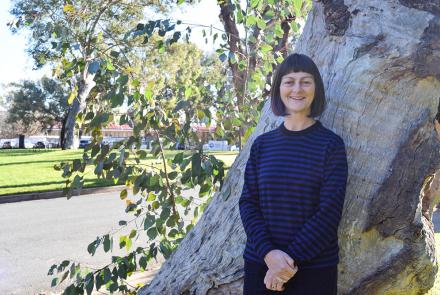
Professor Sharon Friel was awarded the ARC Laureate Fellowship ‘Governance for Planetary Health Equity’. This Laureate Fellowship will use the novel lens of Planetary Health Equity to expose the importance of addressing planetary as well as human systems in achieving global health equity, and investigate the role of the political economy and governance in realizing that aim.
Using international and multi-sectoral comparative analysis, it intends to elucidate how institutions and actors can enable the development of coherent policy and business practices that advance planetary health equity. Expected outcomes include the design of policies and business practices that promote planetary health equity and a governance framework that enables coherent action. The Laureate has the potential to reduce health inequities and climate change.
Read more about Professor Friel’s award.
Professor Frank Jotzo
Professor Frank Jotzo’s research highlights for 2021 include a focus on long-term emissions strategies. The main outputs of this work in 2021 were:
-
Long-term greenhouse gas emissions strategies: a synthesis of best practice (working paper)
- Let’s plan for net zero pains and gains OpEd in the Australian Financial Review (AFR), which can be read on the Australian Financial Review website (paywall), or the Crawford School of Public Policy website.
Among many public engagements and outreach activities, Professor Jotzo was a keynote speaker at the AFR Climate Summit, held in October. His address can be read here. He also spoke at the ANU Crawford Leadership Forum, the Investor Group on Climate Change Forum, the Global Alliance of Universities on Climate conference, the Konrad Adenauer Stiftung trilateral hydrogen forum and the Citibank Annual Investment Conference Asia-Pacific. He was also invited to contribute to several high-level briefing sessions and roundtable discussions.
Professor Jotzo engaged extensively in media outreach over the year, on topics such as emissions targets, domestic and international climate policy, hydrogen subsidies, the decline of coal and
He also appeared alongside ICEDS Director, Professor Mark Howden, and UNSW’s Dr Sarah Kirkpatrick at the National Press Club address, Towards COP26: Hopes and Expectations. The video of this address can be viewed here.
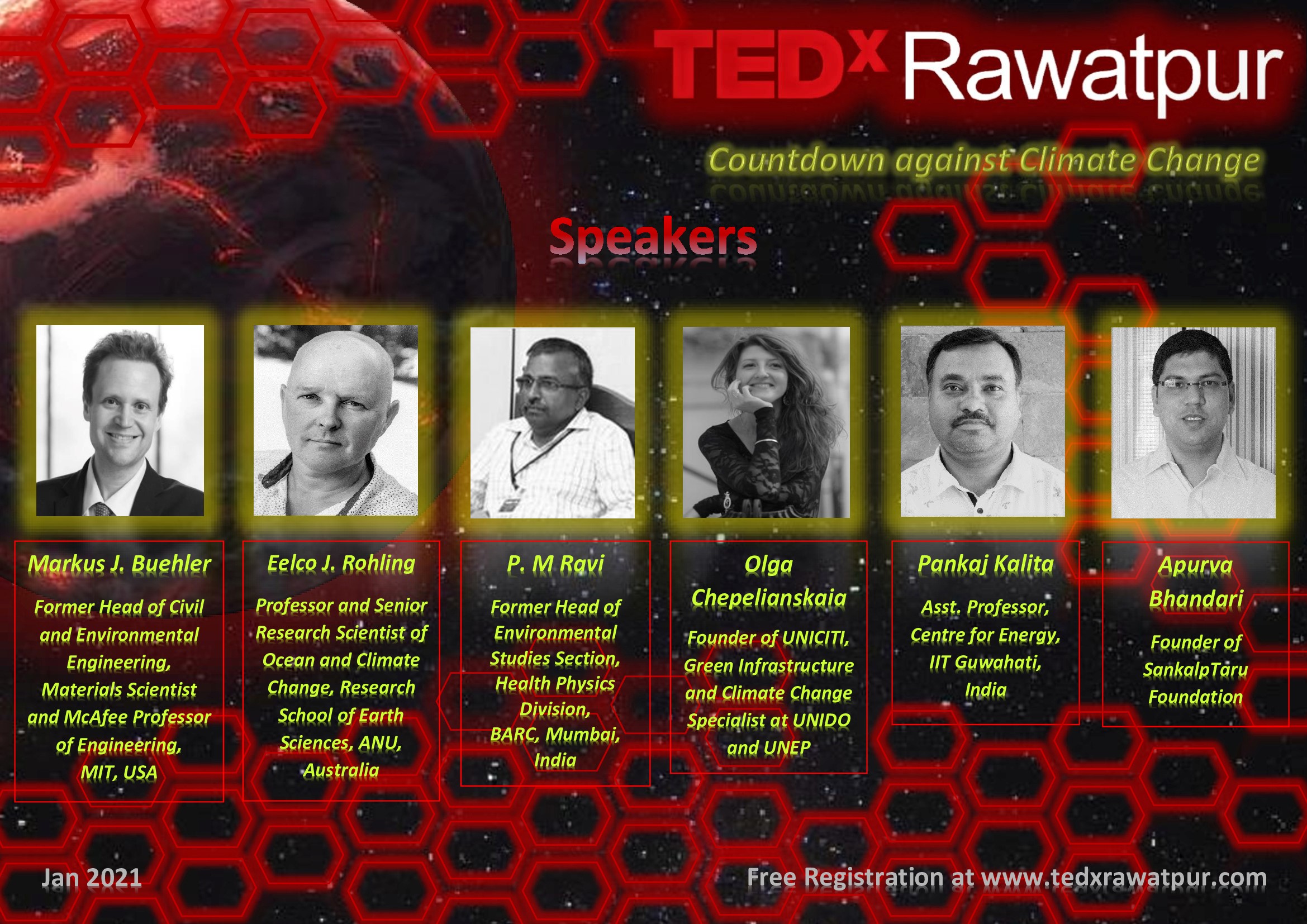
Professor Eelco Rohling
Professor Eelco Rohling presented at TEDx Rawatpur on negative emissions. The presentation titled, Rebalancing our climate: the future starts today (which is the name of Professor Rohling’s upcoming book) can be viewed here.
PhD scholar, Aaron Tang
PhD scholar, Aaron Tang, engaged in the following activity in 2021:
Research
-
A Fate Worse Than Warming? Stratospheric Aerosol Injection and Global Catastrophic Risk, Aaron Tang and Luke Kemp. Facing of woefully insufficient emissions reductions, will we turn to desperate solutions perhaps worse than climate change? This paper analyses the catastrophic risks of Stratospheric Aerosol Injection (SAI) - injecting particles into the atmosphere to reflect sunlight and cool the Earth. In a world of messy politics and bad decisions, resorting to SAI would pose many severe risks and be deeply unwise.
-
The Dark Side of Ambition: Side-Effects of China's Climate Policy, Hongzhang Xu, Aaron Tang, Jamie Pittock. We want to see ambitious climate action, but there is a Dark Side of ambition that is far too infrequently discussed. This paper analyses the side-effects of China's climate policy. These are effective instruments of emissions reduction, but often produce further social and ecological harm.
Education
-
Climate Change: Science, Society, and Policy (ENVS3020/6307): This course explores why climate action is so difficult even when the science is so clear. Students were tasked, with the help of former Chief Scientist Penny Sackett, with creating a mock climate treaty: The Canberra Agreement. This course is convened by Aaron Tang and Frank Mills.
Public Policy
-
COP26 Youth Roundtable: Aaron also attended a youth roundtable that discussed the youth perspectives of COP26 with Jamie Isbister, Australia's Ambassador for the Environment.

COP26 Youth Roundtable Photo: Aaron Tang
-
Discussion chair for the event Learning from the Past: The Potential of Government Engagement: How can youth engage with decision makers and ensure their perspectives are taken into account? Aaron Tang chaired a public event discussing this question with Ariane Wilkinson (Great Barrier Reef Program Manager at WWF Australia), Russell Miles (Department of Foreign Affairs and Trade), and Rose-Anna Selhorst (Co-founder and Director of Youth Engagement at Generation: Politics).
Outreach
-
COP26 Discussion with Global Voices: Mark Howden and Aaron Tang held a discussion on climate policy with COP26 delegates from Global Voices - an NGO that sends young Australians to various international conferences. The discussion covered everything from the false promises of hydrogen to the tug of war between hope and doom.
John Reid
John Reid engaged in the following activity in 2021:
As part of OUTPUT Art after Fire (a pilot project funded by DFAT), John established FieldScreen International. The project aimed to recruit creative artist experienced in field research who could mentor, online, other artists (Southeast AUS and West USA) affected by 2019-20 fires and who would appreciate collegial engagement to re-establish creative practice.
The evaluation report of the pilot project has substantially reconfigured methodology for remote/online creative art mentoring especially with disaster traumatised artist participants. Funding for a more expansive project is currently being sought by FieldScreen International in collaboration with SE Arts and the Blue Mountains City Council.
Artists involved in OUTPUT Art after Fire produced new work for potential exhibition in respective communities as a trauma recovery measure. The project folio, OUTPUT Art after Fire: A Folio, a project output, presents a selection of artwork that can be viewed at: https://www.artafterfire.com.au/
Aileen Marwung Walsh
Aileen Marwung Walsh returned to Western Australia last year, to live near one of Australia’s UN listed biospheres, the Fitzgerald National Park. This move relates to her research which examines cultures to understand how climate change and mass extinctions happened.
Aileen collaborated with the Earth Unbound Deakin University on a journal article; Lobo, Michele, Laura Bedford, Robin Ann Bellingham, Kim Davies, Eve Mayes, Bronwyn Sutton, Aileen Marwung Walsh, and Chloe Lucas. ‘Earth Unbound: Climate Change, Activism and Justice’. Educational Philosophy and Theory, 2021, 20.
One of her previously published poems was selected for the first volume of Best of Australian Poems 2021; Walsh, Aileen Marwung. ‘White Blankets’. Westerly 65, no. 1 (2020).
Aileen was accepted into A British Academy funded workshop series, The Anthropocene and the More-Than-Human World Writing Workshop Series. Learning to use different writing genres for difficult subjects was an amazing discovery for Aileen, and she considers herself lucky to have supervisors, Katerina Teaiwa and Christopher Ballard, both of whom foster the use of creative writing in my research thesis.
Her story on growing up Aboriginal ‘My Childhood’. In Growing Up Aboriginal, edited by Anita Heiss. Sydney Australia: Black Inc, 2018 was taken up by the Learning & Development Team at Victorian Aboriginal Child Care Agency to be used in their training sessions.
Aileen also authored ‘Making the Deep Past Relevant to the Future for the Sake of All Life on Earth | Disruptr’, which was published on Deakin University’s Disruptr (blog).









